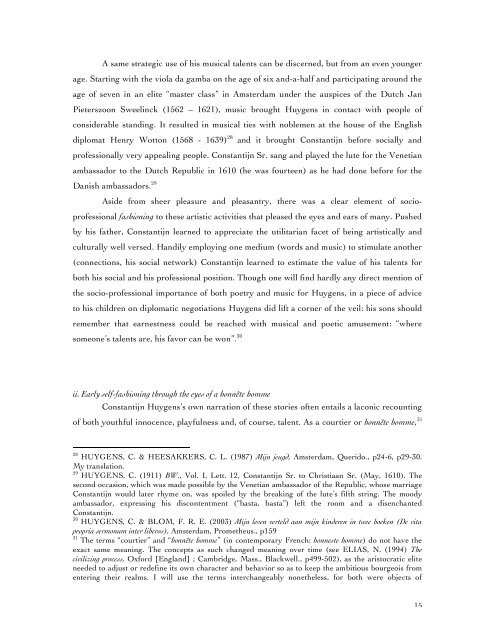Christiaan Huygens – A family affair - Proeven van Vroeger
Christiaan Huygens – A family affair - Proeven van Vroeger
Christiaan Huygens – A family affair - Proeven van Vroeger
You also want an ePaper? Increase the reach of your titles
YUMPU automatically turns print PDFs into web optimized ePapers that Google loves.
A same strategic use of his musical talents can be discerned, but from an even younger<br />
age. Starting with the viola da gamba on the age of six and-a-half and participating around the<br />
age of seven in an elite “master class” in Amsterdam under the auspices of the Dutch Jan<br />
Pieterszoon Sweelinck (1562 <strong>–</strong> 1621), music brought <strong>Huygens</strong> in contact with people of<br />
considerable standing. It resulted in musical ties with noblemen at the house of the English<br />
diplomat Henry Wotton (1568 - 1639) 28 and it brought Constantijn before socially and<br />
professionally very appealing people. Constantijn Sr. sang and played the lute for the Venetian<br />
ambassador to the Dutch Republic in 1610 (he was fourteen) as he had done before for the<br />
Danish ambassadors. 29<br />
Aside from sheer pleasure and pleasantry, there was a clear element of socio-<br />
professional fashioning to these artistic activities that pleased the eyes and ears of many. Pushed<br />
by his father, Constantijn learned to appreciate the utilitarian facet of being artistically and<br />
culturally well versed. Handily employing one medium (words and music) to stimulate another<br />
(connections, his social network) Constantijn learned to estimate the value of his talents for<br />
both his social and his professional position. Though one will find hardly any direct mention of<br />
the socio-professional importance of both poetry and music for <strong>Huygens</strong>, in a piece of advice<br />
to his children on diplomatic negotiations <strong>Huygens</strong> did lift a corner of the veil: his sons should<br />
remember that earnestness could be reached with musical and poetic amusement: “where<br />
someone’s talents are, his favor can be won”. 30<br />
ii. Early self-fashioning through the eyes of a honnête homme<br />
Constantijn <strong>Huygens</strong>’s own narration of these stories often entails a laconic recounting<br />
of both youthful innocence, playfulness and, of course, talent. As a courtier or honnête homme, 31<br />
28<br />
HUYGENS, C. & HEESAKKERS, C. L. (1987) Mijn jeugd, Amsterdam, Querido., p24-6, p29-30.<br />
My translation.<br />
29<br />
HUYGENS, C. (1911) BW., Vol. I, Lett. 12, Constantijn Sr. to <strong>Christiaan</strong> Sr. (May, 1610). The<br />
second occasion, which was made possible by the Venetian ambassador of the Republic, whose marriage<br />
Constantijn would later rhyme on, was spoiled by the breaking of the lute’s fifth string. The moody<br />
ambassador, expressing his discontentment (“basta, basta”) left the room and a disenchanted<br />
Constantijn.<br />
30<br />
HUYGENS, C. & BLOM, F. R. E. (2003) Mijn leven verteld aan mijn kinderen in twee boeken (De vita<br />
propria sermonum inter liberos), Amsterdam, Prometheus., p159<br />
31<br />
The terms “courtier” and “honnête homme” (in contemporary French: honneste homme) do not have the<br />
exact same meaning. The concepts as such changed meaning over time (see ELIAS, N. (1994) The<br />
civilizing process, Oxford [England] ; Cambridge, Mass., Blackwell., p499-502), as the aristocratic elite<br />
needed to adjust or redefine its own character and behavior so as to keep the ambitious bourgeois from<br />
entering their realms. I will use the terms interchangeably nonetheless, for both were objects of<br />
15


